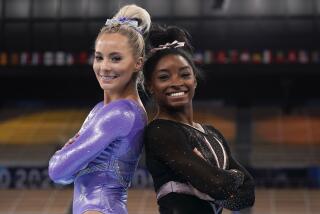Will to Win, Despite Loss
- Share via
NEW YORK — Sometimes, Olympic stories are four years in the telling. That’s how long it took Crystl Bustos, a softball player from Canyon Country who was a member of the United States’ gold medal team in Sydney.
She was here Saturday, at an Olympic media gathering, along with the 17 other members of the U.S. softball team that represents a program that has won the only two Olympic medals offered in the sport -- in Atlanta in 1996 and Sydney in 2000 -- and has been ranked No. 1 in the world for the last 18 years.
There were several hundred athletes here, each with a story to tell. But few like the one Bustos told.
She had begun to talk about her grandmother, Bertha Costro. Bertha was the one who first got her interested in watching the Olympics.
“She had this big old hat,” Bustos said, “and she had it plastered with Olympic pins, and she’d wear it during the Games when I was little, and we’d watch. It had so many pins on it that it would kind of flop to one side.”
The obvious follow-up question came next. Was your grandmother alive to see you win the gold medal in Sydney?
Bustos, a muscular power hitter who recently cranked a home run more than 350 feet in a game in Texas and had the international softball community buzzing in Sydney with three towering home runs in the first three games of the Olympic tournament, responded by beginning to tear up.
“No, she had died by then,” Bustos said, pausing.
“My grandfather didn’t see it, either. He died during our third game in Sydney.”
Bustos, tears no longer held back, explained that her grandparents had a major role in raising her while her parents worked, and that Santos Costro, who had retired from his job as a janitor in Beverly Hills, had suffered a fatal heart attack back home in California.
“I was told after the third game,” she said. “I told my family we were going home. They talked me out of it. They said everything back in L.A. was being handled, that I should stay with the team.”
She said she had talked to him on the phone a few nights before he died. He had been fine.
She said she got lots of support from her teammates, who kept her secret from the press and public at her request. But she said the rest of the Games, especially three consecutive defeats from which the U.S. rebounded to win the round-robin event, were a struggle for her.
“It was there, in the back of my mind, the rest of the way,” she said. “I pulled back. I kept it under wraps as much as I could. I didn’t want to make it into a big freak show.
“But I wasn’t the same.”
Bustos and her teammates struggled through a series of dramatic games and eventually made it all the way back to win the gold medal game. And that medal has proved to mean as much to her as any Olympian.
“I take it with me when I speak to groups,” she said. “Many times, the reaction is amazing. I put it around the neck of a man one time and he was so overwhelmed he started shaking so hard he couldn’t control himself.”
That ranks as her second most memorable moment with her gold medal. Her first was immediately after the Games. They had delayed the funeral until she returned. The burial was in Culver City.
“I went to my grandfather’s casket,” she said, “and I just set it there, right on top.”
That was the end of the story. Elaboration came in the form of more tears.
More to Read
Go beyond the scoreboard
Get the latest on L.A.'s teams in the daily Sports Report newsletter.
You may occasionally receive promotional content from the Los Angeles Times.







